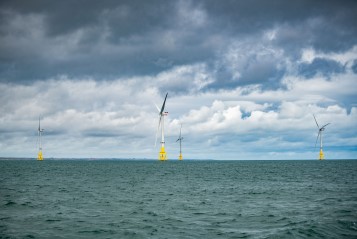
Why is UK transport decarbonisation top of the agenda?
Since 1990, carbon emissions in the UK have fallen by 42%, yet emissions from vehicles have stayed the same since 2008. Now transport is the largest emitter of greenhouse gases in the UK. The Committee on Climate Change recommend to the UK government that sales of petrol and diesel cars should be blocked by 2030.
Anthony Hinde, Director, InCharge Solutions tells us more about why it is crucial for the UK government and organisations like Vattenfall to work together to help our customers drive free from fossil fuels within one generation.
Find out more about InCharge UK.

Anthony Hinde, Director, InCharge Solutions UK
What are the key challenges within the UK’s electric vehicle industry at the moment?
Up until now the market has grown slower than many predicted. I see three main reasons why this has been the case.
1. A lack of vehicles in terms of both range of what is on offer, and availability of supply. For example, the waiting list for new vehicles is as much as one year on both the Kia e-Niro and the Tesla Model 3. It is even longer for the light commercial market which continues to be poorly served by manufacturers.
2. Public charging infrastructure. As a supplier of public charging infrastructure we like to see plentiful chargepoints in useful places being well utilised. The public wishes to see a similar thing, but they wish to see them empty and available to give them the confidence they can charge on the go. The government must continue to encourage further roll-out of these public units, even if this is at the expense of funding business and home units. Tackle these and we will eliminate the public’s concerns about plentiful and available chargepoints in accessible places. This is not to forget the role of the industry who, like Vattenfall, must continue to invest with long time horizons, and must also ensure chargepoints offer reliability and convenience.
3. Further incentives for electric vehicle uptake when compared with petrol and diesel vehicles. Clean Air Zone schemes and reduction in benefit-in kind and road tax for company car drivers are key here, and I would like to see stronger incentives in the short term in order to make it more financially advantageous to run electric vehicles, rather than those that run on fossil fuels.
What is roaming and why is it important for electric vehicle drivers?
This is another key challenge which the sector needs to address. The charging stations that are in place in the UK are provided by different companies, meaning that drivers are required to set up an account with the provider of each different charging station. With roaming, drivers can use any charging station under one account. Roaming will lead to the integration of the electric vehicle charging network in the UK and beyond, and the driver, with a single account, will have a much simpler life. With Vattenfall’s InCharge, we are seeking roaming agreements with other operators or driver service providers in the UK. This means that InCharge drivers will have access to an expanding, reliable and easy to use network across the country and northern Europe, where roaming is already possible and InCharge has over 10,000 electric vehicle charging stations, and access to a further 40,000.
What is the UK Government doing to decarbonise the sector?
The Government’s Road to Zero strategy and the significant levels of public funds available show that the UK Government has clearly grasped the importance of decarbonising the sector, but, with such a huge challenge ahead, more needs to be done. It is critically important that the growth of the electric vehicle and charging sector is strongly incentivised. Whilst we all pay penalties, like London’s Ultra Low Emission Zone and the road tax, its key that we increase costs on polluting cars and lower for cleaner vehicles. I would also like to see funds diverted away from home chargepoints and vehicle subsidies to more public schemes, in order to make the financial benefits offered by the government benefit greater numbers, especially for those who perhaps do not have driveways.
Are there other organisations or businesses that could help to make a difference?
Leadership is really needed from devolved administrations, local authorities, businesses with vehicle fleets and developers of new property if we are to have a huge impact on installing electric vehicle charging infrastructure and/or electrifying fleets. Around 80-90% of charging seems to be when the car is parked for four hours or more, which tells us making workplace charging and home charging accessible, especially for those people without driveways, is key. We welcome governmental initiatives, like making requirements for new developments to have at least 10% of car parking spaces with chargepoints. But, we feel that this does not go far enough and would like to see a much higher percentage of chargepoints mandated.
Video player requires marketing cookies.
To view this content please click here to allow marketing cookies.
Flexpower in Amsterdam: the first flexible charging network for electric vehicles.
If there is limited charging infrastructure isn’t it the perfect time for businesses like InCharge to really take off?
We think so. We’ve already had some exciting projects come online, including charging stations in Canterbury, Norfolk and at our Pen y Cymoedd Wind Farm in South Wales, all powered by our wind farms. Further incentives for businesses and individuals to invest in electric vehicles and accompanying infrastructure are welcome, critically the future of the charging schemes beyond the next year. In addition, further integration of the many public transport infrastructure systems and also the integration of public with private transport – making electric car charging stations available at train stations for example.
What are the next steps for InCharge?
We’ll be working closely with governments and local authorities around the UK to tackle some of the challenges outlined above. In addition, we’re still seeking new business leads and partnerships for things like roaming.
It is a period of growth for us and whilst at the moment we are seeking partnerships with fleet owners, commercial property and public bodies, domestic charging points are an important segment and are in our future plans.
Video player requires marketing cookies.
To view this content please click here to allow marketing cookies.
InCharge electric vehicle charging points at Pen y Cymoedd Wind Farm.
Resources
Shifting emissions into reverse gear – priorities for decarbonising transport





